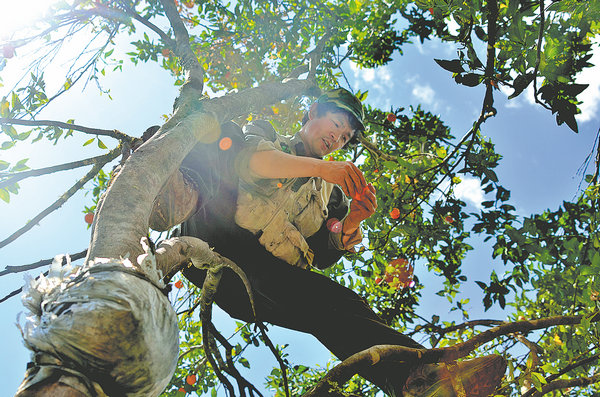Popular vlogger is a natural teacher


University professor using social media to popularize bioscience and help modern urbanites get comfortable in the great outdoors, Yang Feiyue reports.
Guo Guangpu can be a bit eccentric outside the classroom. Instead of acting all prim and proper, the ecology professor from Tongji University in Shanghai breaks the stereotypical image of a stuffy educator, especially when he can be seen sniffing bird droppings, or even pretending to eat them for dramatic effect.
As viewers of this seemingly odd behavior are taken aback, Guo explains: "There is less water and more uric acid in the bird poop, so it can avoid water loss.
"Neither does the bird have a bladder to store the urine, in order to keep the body light, so, that explains the constituents of the droppings," he says.
This somewhat dramatic approach to imparting such knowledge has proved effective in his teaching subjects.
In front of the camera, Guo has mostly maintained a smile, one that highlights the wrinkles that give away his age, but exudes a childlike curiosity and enthusiasm for knowledge.
People can find information on a wide range of interesting natural phenomena in Guo's educational videos on the popular short video sharing platform Douyin, including why pandas prefer bamboo to meat, the differences between Tibetan foxes and their lowland counterparts, as well as an introduction to other canine species that are not dogs.
To date, Guo has made more than 100 short science videos about animals and plants, as well as urban ecology systems, through the presentation of interesting field research. In doing so, he has attracted more than 14,000 followers since March.
His followers have watched his trips to uncover unusual knowledge behind subtropical plants, such as mimosa and lychee in Dongguan of Guangdong province, seen the Asiatic toad and Tianmu odorous frog at close quarters on Tianmu Mountain in Zhejiang province, and discovered weird fruits of various shapes and sizes in Yunnan province.
"Science videos are not easy to do, you have to maintain professionalism while also ensuring that the presentation is lively and interesting, so that people with different levels of knowledge can understand," Guo says.
He has stuck to the scientific rigor expected of a university professor in producing these online works, and has looked up a lot of information to ensure that there are no mistakes.
For example, Guo says he read several doctoral theses just to answer accurately the question about how much bamboo a giant panda consumes a day, before delivering the explanation in plain words.
He also likes to physically demonstrate facts.
In a video, he had a gecko bite his finger to prove the reptile doesn't chew, and then showed how this creature's teeth are only for keeping food from falling out of its mouth.
His efforts have appealed to a group of fans longing to expand their knowledge online.
Some of his videos have received as many as 17,000 likes.
"Under the guidance of Professor Guo, even without leaving home, I am able to appreciate the vast land and abundant natural resources across the country," says Ren Jiaxi, one of Guo's Douyin followers.
"His video is like a spell that stimulates your interest in learning," Ren adds.




































